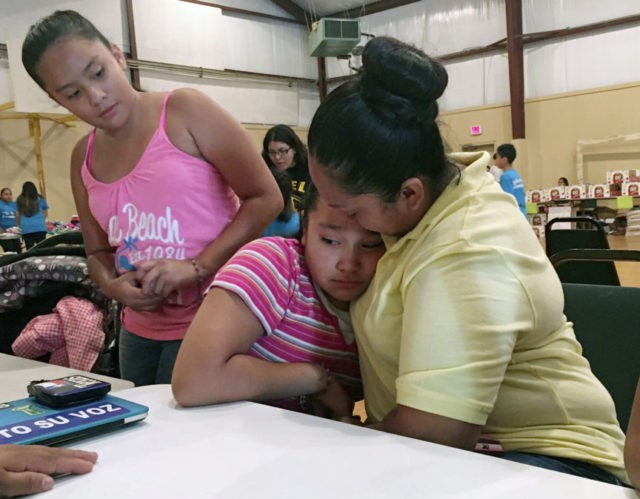The Department of Justice (DOJ), acting on President Donald Trump’s executive order seeking to keep parents charged with illegally crossing the U.S. border united with their children, asked the U.S. District Court for the Central District of California Thursday to grant the government relief from 1997’s “Flores Settlement.”
The Flores Settlement governs the conditions under which U.S. Immigration and Customs Enforcement (ICE) and other government agencies may hold children in detention. It generally prohibits keeping migrant children in the facilities used to hold illegal aliens awaiting trial for their alleged crimes and, in its current iteration, forbids keeping such children in detention longer than 20 days.
In his executive order Wednesday, President Trump commanded DOJ to “promptly file a request with the U.S. District Court for the Central District of California to modify the [Flores Settlement.]” Thursday, DOJ, in the name of acting Assistant Attorney General Chad Readler, did just that, asking the court to allow the housing of parents and children together at ICE facilities and to acknowledge that these ICE facilities do not need to be, as with other child-care facilities, licensed by the states they are in. The latter request is necessary as, under current law, the state agencies in question cannot license facilities that hold both adults and children.
In its supporting brief, DOJ lays out the situation in which it finds itself due to the Flores Settlement’s strictures:
When the U.S. Department of Homeland Security (“DHS”) apprehends a family with minor children illegally entering the United States outside a port of entry, it traditionally has three options to choose from: (1) keep the family together by placing the family members at an appropriate residential facility during the pendency of their immigration proceedings; (2) separate the family by detaining the parents and transferring the children to U.S. Health and Human Services (“HHS”) custody; or (3) provide the family with a Notice to Appear for removal proceedings, release the family members from custody into the interior of the United States, and accept the now-common reality that families frequently fail to appear at the required proceedings, thus remaining illegally in the United States.
This in turn, makes universal enforcement of immigration laws impossible without separating illegal alien parents from their children while they await trial, the same eventuality that sent the media and political left into a week-long furor before the issuance of Trump’s executive order Wednesday. So long as the Flores Settlement remains in place as it is now interpreted, the administration’s desired solution as stated, to keep families together in detention at the border, is illegal.
As the DOJ brief argues:
Only the first option accomplishes the dual goals of enforcing federal law and keeping families together … Unfortunately, however, this Court’s construction of the Flores Settlement Agreement eliminates the practical availability of family detention across the nation, thus creating a powerful incentive for aliens to enter this country with children in violation of our criminal and immigration laws[.]
Later, the brief is even more emphatic. “Under current law and legal rulings, including this Court’s, it is not possible for the U.S. government to detain families together during the pendency of their immigration proceedings. It cannot be done,” it reads.
This is not the first time the Justice Department has asked the Central District of California to reconsider its interpretation of the Flores Settlement. In the aftermath of 2014’s “unaccompanied minor” crisis, the Obama era DOJ under Attorney General Eric Holder made virtually the same request, to allow family detention to deal with the flood of humanity surging across the southern border to take advantage of rumors they would be allowed into the United States.
The Obama administration made many of the same arguments, including that “catch and release” is a powerful incentive for aliens to attempt to enter the U.S. illegally. In its Thursday filing, DOJ quotes an Obama era ICE official who argued in 2015 that, “One reason those families “decide to make the dangerous journey to illegally enter the United States is that they expect to be released from custody.”
Because the government is making this request directly to the court, there is not an opposing side to offer an official response. Given the history of this litigation, which has been going on now for more than 30 years, the court can be expected to grant several open-borders groups the right to file briefs arguing against allowing the administration to keep families together. If the court rules in agreement with these groups, as it did in 2015, it will leave the administration no choice but release illegal aliens into the United States or start separating families again.
Both Trump, through his executive order, and the Justice Department are urging Congress to prevent that possibility. “Irrespective of the Court’s decision in Flores, it is incumbent for Congress to finally act to keep families together, end catch and release, and create the foundation for an immigration system that serves the national interest,” a DOJ spokesman said in a statement.

COMMENTS
Please let us know if you're having issues with commenting.